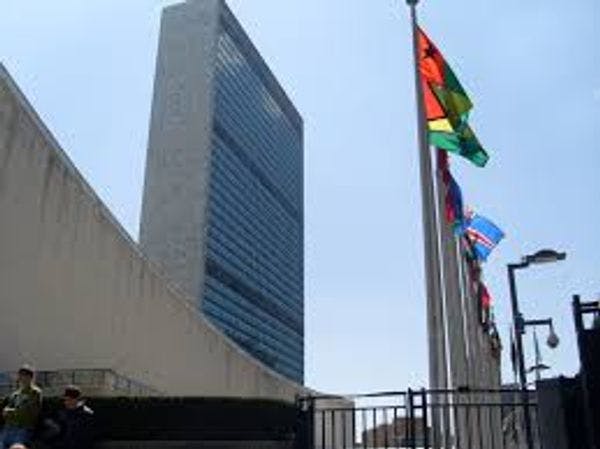Will UNGASS 2016 be the beginning of the end for the ‘war on drugs’?
In April 2016, the UN will dedicate, for the third time in its history, a United Nations General Assembly Special Session (UNGASS) to discuss global drug policy. The UNGASS has the potential to be a ground-breaking moment that could change the course of the international drug control system. However, political divisions and entrenched institutional dynamics have dampened hopesthat it will go down in history as the beginning of the end of the war on drugs.
At the joint request of Mexico, Colombia and Guatemala, the General Assembly decided to bring forward the convention of a special session to assess “the achievements and challenges in countering the world drug problem”, originally foreseen for 2019 or 2020. The three countries stated at the time that “revising the approach on drugs maintained so far by the international community can no longer be postponed”, and the UN needed to exercise leadership to "conduct an in-depth review analyzing all available options, including regulatory or market measures, in order to establish a new paradigm that would impede the flow of resources to organized crime groups". An international meeting had to be convened, “capable of taking the decisions necessary to increase the effectiveness of the strategies and instruments with which the global community addresses the challenges of drugs and their consequences”.
Conventional drug control wisdom has put forward the view that stopping the supply of drugs at the source would solve the ‘world drug problem’, but Latin American countries bear witness to the failure of this approach. Stirred into action by the futility of spending billions of dollars to fight an unwinnable and increasingly violent war on drugs, it is no surprise that political leaders from Latin America have been at the forefront of the drug policy debate. From their perspective, the high human cost in terms of violence, insecurity, mass incarceration and the exacerbation of the social and economic vulnerability of some of society’s most marginalised groups – can no longer be justified as necessary collateral damage in pursuit of eradicating drug markets.
A growing group of Latin American and Caribbean countries are calling for a real discussion on alternative policies. In the meantime, Uruguay has moved to create the world's first national legally regulated cannabis market for recreational use, and similar initiatives have happened in the US at the state level. This opening up of the long entrenched and seemingly immovable discussion on prohibitionist drug control principles is unprecedented and has implications for global policy.
In this context, the UNGASS in April represents a critical juncture, an opportunity for an honest evaluation of global drug policy and how to address the most pressing challenges going forward. Secretary General Ban Ki-moon, in recognition of this rare and important opportunity, has urged member states to use the 2016 UNGASS “to conduct a wide-ranging and open debate that considers all options.”
The UNGASS preparations
The initial discussions to prepare for the UNGASS were fraught with disagreements over many procedural aspects. These included difficult negotiations over the extent to which the UN Commission on Narcotic Drugs (CND) in Vienna would lead the process; how to strike the right balance between the UN capitals of Vienna, Geneva and New York in the preparations; how to ensure meaningful involvement of all relevant UN agencies, academia and civil society; and – last but not least – how open the debate should be: should it be restricted to a discussion of how to improve the implementation of the 2009 Political Declaration and the achievement of its targets for 2019, or should the UNGASS be an opportunity to challenge the current global drug control strategy, possibly even questioning its foundation of the three UN drug conventions?
These difficult negotiations, which on the surface often appeared to be arguments over procedure, reflected the deep political divisions within the international drug policy debate. The much-revered ‘Vienna Consensus’ continues to weaken as the divide between some governments becomes increasingly irreconcilable. A growing number of countries now believe that the traditional repressive drug control approach, based on zero-tolerance, has not worked and has led to disastrous consequences for human rights, public health, citizen security and sustainable development, and as a result it has to be modernised.
Some countries calling for an open and inclusive debate at the UNGASS questioned whether this could be truly achieved with a process led by the Vienna-based drug control apparatus, given that the CND, the UN Office on Drugs and Crime (UNODC) and the International Narcotics Control Board (INCB) have all gained quite a conservative reputation over the decades. Conducting all the preparations in Vienna led to a further problem for inclusivity, given that at least 70 member states do not have permanent representation there and would therefore struggle to fully participate in the process. The point of convening an UNGASS, is that by definition all UN member states and the whole UN system should be included on a equal basis, but limiting the political negotiations on the outcomes exclusively to Vienna, means that in practice the countries and UN agencies not represented in Vienna have much less influence on the process.
Click here to read the full article.
Keep up-to-date with drug policy developments by subscribing to the IDPC Monthly Alert.
Thumbnail: Wikimedia Commons
